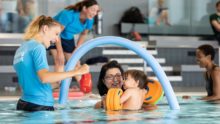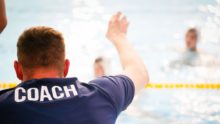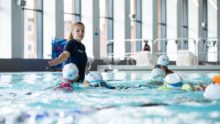
Becoming a lifeguard in the UK
January 30, 2016 Careers AdviceBecoming a lifeguard is an excellent career choice at whatever stage of life! The life skills learnt can be widely used and transferred to other jobs. The role provides many opportunities, including working abroad, starting a career in the leisure industry, working flexible hours to fit your home life or other commitments, keeping active during retirement, or earning whilst studying.
Lifeguards learn first aid and lifesaving skills during their training and play an essential role in ensuring that the public is safe around water. The role of a lifeguard is varied, maintaining safety in and around the pool, educating swimmers about water safety, giving first aid and conducting rescues in emergencies. Lifeguards working in pools with dryside facilities may also have responsibility for tasks within those areas such as setting up equipment.
The nature of the job means that roles are available on a full-time, part-time, seasonal, or casual basis – meaning lifeguarding can be undertaken as a career choice or alongside other commitments.
First steps to becoming a lifeguard
The Royal Life Saving Society UK (RLSS UK) is the UK and Ireland’s leading provider of training in lifesaving and lifeguarding – visit their website to find out everything you need to know about becoming a lifeguard.
Alternatively, contact your local leisure centre or swimming pool to learn more about lifeguarding and local lifeguard courses and job opportunities.
Qualifications
Qualifying to work as a lifeguard is a relatively simple process.
The RLSS UK’s National Pool Lifeguard Qualification (NPLQ) is the most widely recognised lifeguard qualification in the UK & Ireland – with more than 90% of all pool lifeguards qualified through RLSS UK, and is a requirement for most lifeguarding jobs in these countries.
The NPLQ course requires a minimum of 36 hours of training. Once completed, the candidate will be fully qualified to work as a pool lifeguard (in the UK and Ireland).
Requirements for qualification
- You must be 16+ years of age when taking the final NPLQ assessment.
- You must be able to jump/dive into deep water, swim 50 metres in less than 60 seconds, swim 100 metres continuously on front and back in deep water, tread water for 30 seconds, surface dive to the floor of the pool and climb out unaided without ladder/steps and where the pool design permits.
NPLQ courses are available at leisure centres and venues across the UK and Ireland. Click here to find out more on the RLSS UK website.
Costs
Training costs for becoming a lifeguard can vary between £200 and £300, depending on the provider and location.
Funding is available for some courses – speak to the course provider to find out more.
And once I’ve qualified?
Once you’ve completed your NPLQ, you’re fully qualified and ready to find a job as a pool lifeguard. So head over to our jobs page and look out for vacancies.
Does my NPLQ mean I can work as a beach lifeguard?
No, if you want to work as a lifeguard at a beach, there is a separate qualification in the UK – the RLSS UK National Vocational Beach Lifeguard Qualification (NVBLQ).
You can search for courses on the RLSS UK website here.
 Careers in Aquatics
Careers in Aquatics



